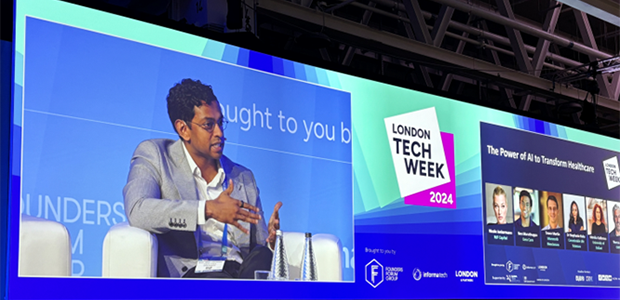
Preventative tech could save NHS billions, says Great British Entrepreneur of the Year
Great British Entrepreneur of the Year, Dr Ben Maruthappu, has called for the next UK government to embrace the potential of preventative tech to save lives and solve the NHS crisis.
Speaking at a panel at London Tech Week this week, the doctor-turned-entrepreneur said preventative technology and AI could save the NHS billions of pounds, going a long way to plug the £18 billion public spending gap highlighted by the Institute for Fiscal Studies (IFS).
“’Prevention is better than cure’ is a phrase we’ve used in medicine for hundreds of years,” said Dr Maruthappu, a former A&E GP, “but it’s never been more relevant than now. As innovators, we have an unprecedented opportunity to embrace the preventative power of AI, saving lives and transforming health outcomes for millions of people.”
Maruthappu is the founder and chief executive of Cera, an AI-led home healthcare provider which is projected to save the UK government £1 billion per year by the autumn of 2026 by taking care out of hospitals and into patients’ homes. Cera uses preventative tech and smart AI algorithms to predict and prevent 80% of health risks seven days in advance, reducing hospitalisations of its elderly patients by up to 70%.
Prior to launching Cera, Dr Maruthappu served as Innovation Advisor to the NHS, co-founding the NHS’s Innovation Accelerator, which brings new technology into the NHS to save and improve patients’ lives. In 2020 he was awarded an MBE for services to health and social care technology.
“We need to see tech innovators working hand-in-glove with government and the NHS to solve the crisis in health and social care,” said Dr Maruthappu. “Preventative technology can deliver huge cost savings and efficiencies for the next government – going a long way to closing the £18 billion spending gap the IFS has highlighted.
“Cera’s model alone is projected to save the NHS and government £1bn per year by 2026. If Cera alone can save the government £1 billion per year – imagine what hundreds of innovators across the health tech world could achieve together.
“It is absolutely imperative that the next government leans into the potential of preventative tech and AI to save lives, deliver more preventative care in the community, and solve the NHS crisis.”
Ahead of the Labour manifesto launch this week, Dr Maruthappu also commented on the need to solve major workforce challenges in health and social care.
“Another urgent focus for the next government is building sustainability into the workforce in health and social care,” said Dr. Maruthappu. “Currently there is a 155,000-vacancy gap in social care which needs filling - not through short-termist solutions like exploiting and misleading migrant workers, as we’ve seen in the news, but through building careers out of care. Tech can play an important role here too: helping us attract, upskill and retain thousands of new health and social care workers.
“We need to remind people how rewarding a career in health or social care can be - with lots of opportunities as these sectors innovate and grow to support our ageing population.
“There is a perception that care is a low-skilled, low-paid career, but the opposite can also be true. Care work can be very complex and challenging. It needs to be recognised as such, and we need to put an end to short-termist and exploitative practices such as luring migrant workers over to the UK under false promises of steady employment.”
Cera invests in dedicated career pathways for all its people, with hundreds of active apprenticeships, and dedicated training to enable its people to make swift progress in their careers.

